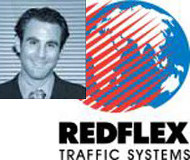Article from: www.thenewspaper.com/news/50/5017.asp
8/9/2016
Federal Judge Issues Interim Ruling In Redflex Fraud Suit
Former Redflex executive will not be able to profit from Chicago, Illinois false claims lawsuit.
 A federal judge on Monday refused to allow a former Redflex executive to gain any personal profit from an ongoing lawsuit against the Australian red light camera firm. Aaron M. Rosenberg filed a "qui tam" legal action against his former employer in 2014, but the city of Chicago, Illinois has since taken over the suit charging Redflex with lying in official documents. Neither Redflex nor Chicago wanted Rosenberg involved.
A federal judge on Monday refused to allow a former Redflex executive to gain any personal profit from an ongoing lawsuit against the Australian red light camera firm. Aaron M. Rosenberg filed a "qui tam" legal action against his former employer in 2014, but the city of Chicago, Illinois has since taken over the suit charging Redflex with lying in official documents. Neither Redflex nor Chicago wanted Rosenberg involved.
"Redflex's motion appears to be animated, at least in part, by its view -- evident in its briefs -- that Rosenberg is now seeking to profit from the actions he took that caused the company to lose hundreds of millions of dollars in business and exposed it to substantial potential liability in this lawsuit," US District Judge John J. Tharp Jr wrote on Monday. "Reading Redflex's briefs, it is difficult to avoid the conclusion that its primary purpose is to deny Rosenberg any portion of a future damage award."
The money at stake is substantial, as restitution for violating the city ethics law could cost Redflex $383 million. Redflex gambled on getting away with securing Chicago's red light camera contract through $2 million in bribes. It lost the gamble, but not before pocketing $125,904,645 in profit, in addition to the $500 million it collected for Chicago.
Before Redflex could finalize the most lucrative red light camera contract in the country, it had to sign documents affirming the company did not bribe city officials. Those fraudulent signatures triggered Chicago's false claims ordinance, which allows the city to recover money spent on contracts signed based on false statements. Rosenberg could only be a part of the lawsuit against Redflex if he could show that he was the original source that exposed the fraud.
Judge Tharp was convinced that the Chicago Tribune newspaper blew the whistle on Redflex misconduct beginning in October 2012, based on revelations from a Redflex executive -- not Rosenberg -- who disclosed the illegal scheme in an August 2010 memo. By the time Rosenberg filed his case on April 15, 2014, the public was well aware of the Redflex fraud.
"They knew the duration of the scheme, the principal individuals involved, the value of the bribes, and the mechanisms by which the bribes had been paid," Judge Tharp explained. "They knew that Redflex had acknowledged the bribery scheme and that it implicated a number of the company's senior executives, that the city had barred Redflex from bidding on other projects and from renewing its [red light camera] contracts based on the bribery scheme, and that a federal criminal investigation was proceeding. They knew, in short, that the entire history of the city's red-light camera program had been besotted by the corrupt relationship between [John] Bills and Redflex Traffic Systems Inc."
Judge Tharp explained it was understandable that, as a participant in the bribery scheme, Rosenberg was able to provide more detail about what happened. Extra detail, however, did not prove to be enough for Rosenberg to share in the proceeds from the case.
"One who sits on information about fraudulent conduct for years and coughs it up only when the government comes knocking does not qualify as an 'original source' of information about that fraud because such a disclosure cannot be considered voluntary," Judge Tharp concluded. "To hold otherwise would substantially undermine the efficacy of the incentives qui tam statutes offer."
A copy of the judge's order is available in a 177k PDF file at the source link below.
Source: Chicago v. Redflex (US District Court, Northern District Illinois, 8/8/2016)
Permanent Link for this item
Return to Front Page
 A federal judge on Monday refused to allow a former Redflex executive to gain any personal profit from an ongoing lawsuit against the Australian red light camera firm. Aaron M. Rosenberg filed a "qui tam" legal action against his former employer in 2014, but the city of Chicago, Illinois has since taken over the suit charging Redflex with lying in official documents. Neither Redflex nor Chicago wanted Rosenberg involved.
A federal judge on Monday refused to allow a former Redflex executive to gain any personal profit from an ongoing lawsuit against the Australian red light camera firm. Aaron M. Rosenberg filed a "qui tam" legal action against his former employer in 2014, but the city of Chicago, Illinois has since taken over the suit charging Redflex with lying in official documents. Neither Redflex nor Chicago wanted Rosenberg involved.